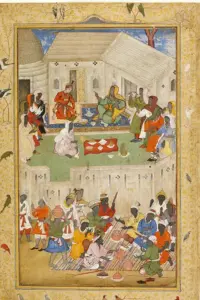
Unveiling Ancient Ties: The legacy of African kings in India
Amidst the historical splendor of India, a lesser-known yet remarkable chapter involves African rulers who once commanded realms across the subcontinent. From Bengal to Janjira, these African kings not only shaped the course of Indian history but also exemplified the deep-rooted connections between Africa and South Asia.
Origins and Arrival
The story begins with the arrival of Africans, known as Siddis or Habshis, in India. These individuals, originally from the eastern coast of Africa and the Horn of Africa, arrived through various means—traded, sold as slaves, or recruited as soldiers. Their journey from Africa to India dates back to the early medieval period, establishing a historical connection that would evolve into significant political and cultural exchanges.
The Habshi Dynasty in Bengal
One of the most fascinating chapters in this history is the rise of the Habshi dynasty in Bengal. Shahzada Khoja Barbak, an Ethiopian prince, established this dynasty in 1487. His reign was marked by efforts to consolidate power and integrate his African heritage with the local traditions. His successor, Malik Andil Khan, also known as Saifu-d-din Abul Muzaffar Firuz Shah, expanded the dynasty’s influence, promoting economic development and cultural growth. Under his rule, Bengal saw advancements in architecture and urban planning, including the construction of significant buildings and infrastructure.
READ ALSO: Legacy of the Moors: Transforming the Iberian Peninsula for nearly 8th centuries
The Resilient Siddis of Janjira
Off the western coast of India lies the fortified island of Janjira, a key site in the history of the Siddis. The Siddis, who began establishing control over Janjira in the 17th century, were known for their formidable naval capabilities. Siddi Ambar Sainak, a prominent leader, turned Janjira into a bastion of resistance against Portuguese, Maratha, and British forces. His strategic acumen and military prowess were instrumental in maintaining the independence of Janjira, making it a symbol of African resilience and influence in India.

Cultural Integration and Contributions
These African rulers were more than conquerors; they were integrators of cultures. They adopted local customs, languages, and religions while contributing their own traditions and influences. Malik Ambar, born in Ethiopia and sold into slavery, rose to become a powerful regent in the Deccan Sultanate of Ahmadnagar. His administration was marked by significant reforms in finance, agriculture, and military organisation. His governance not only stabilised the region but also fostered a unique blend of African and Indian cultural elements.
Enduring Legacy
The legacy of African kings in India is evident in various aspects of Indian history and culture. Architectural contributions, such as the fortifications and buildings constructed by these rulers, continue to be landmarks of historical significance. The Siddis’ influence is also seen in the cultural and social fabric of India, particularly in communities that have preserved their African heritage through generations.
Revisiting and Celebrating Historical Ties
The story of African kings in India highlights the rich, often overlooked, interactions between Africa and Asia. It reveals how African rulers not only left their mark on Indian history but also contributed to a shared heritage that transcends geographical and cultural boundaries. By revisiting and celebrating these historical connections, we honor the legacy of African rulers and recognise their significant role in shaping the diverse and interconnected world we know today.
Follow the Neptune Prime channel on WhatsApp: https://whatsapp.com/channel/0029Va74ZvU2v1IqKByXoX3d
Do you have breaking news, interview request, opinion, suggestion, or want your event covered? Email us at neptuneprime2233@gmail.com

